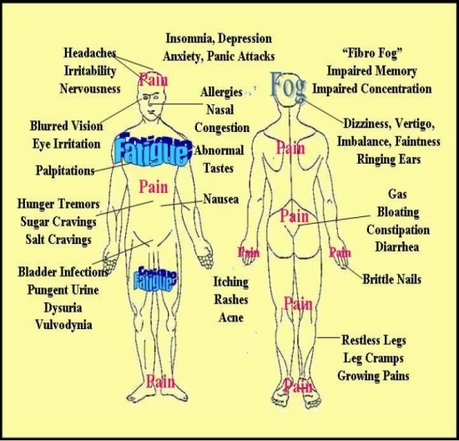
Fibromyalgia is a common syndrome in which a person has long-term body-wide pain and tenderness in the joints, muscles, tendons, and other soft tissues.
Fibromyalgia has also been linked to fatigue, sleep
problems, headaches, depression, and anxiety.
The cause is unknown. Possible causes or triggers of fibromyalgia include:
· Physical or emotional trauma (i.e car accidents, pneumonia, flu, death)
· Abnormal pain response - areas in the brain that are responsible for pain may react differently in people with fibromyalgia (neurotransmitters).
Fibromyalgia has also been linked to fatigue, sleep
problems, headaches, depression, and anxiety.
The cause is unknown. Possible causes or triggers of fibromyalgia include:
· Physical or emotional trauma (i.e car accidents, pneumonia, flu, death)
· Abnormal pain response - areas in the brain that are responsible for pain may react differently in people with fibromyalgia (neurotransmitters).
Symptoms
Pain is the main symptom of fibromyalgia. It may be mild to severe, and / or fluctuate in duration and time of day.
· Painful areas are called trigger points. Tender points are found in the soft tissue on the back of the neck, shoulders, chest, lower back, hips, shins, elbows, and knees. The pain then spreads out from these areas.
· The pain may feel like a deep ache, or a shooting, burning pain.
· The joints are not affected, although the pain may feel like it is coming from the joints.
However some with fibromyalgia tend to wake up with body aches and stiffness. Pain improves during the day and may worsen at night. On the other hand, it can inflict pain all day long. It may worsen by activity, intensity, location and duration. Other exterior factors could include cold or damp weather, anxiety, and stress.
Fatigue, depressed mood, and sleep problems are seen as common symptoms in almost all cases of fibromyalgia. Many struggle as that they can't get to sleep, stay asleep, and yet awaken feeling fatigued. Other symptoms of fibromyalgia may include:
· Irritable bowel syndrome (IBS)
· Memory and concentration problems
· Numbness and tingling in hands and feet
· Palpitations
· Reduced ability to exercise
· Tension or migraine headaches
· Sensitivity to noise and/or light
· Widespread pain and tenderness
· Also may include Chronic Fatigue Syndrome
Signs and tests
To be diagnosed with fibromyalgia, you must have had at least 3 months of widespread pain, and pain and tenderness in at least 11 of 18 areas,
including
· Arms (elbows)
· Buttocks
· Chest
· Knees
· Lower back
· Neck
· Rib cage
· Shoulders
· Thighs
For additional information you can consult the following specialists:
· Neuorologist
· Dermatologist
· General Practitioner
· Sleep specialist
· Rheumatologist
· Pain clinic
Calling your health care provider
Call your health-care provider if you have symptoms of fibromyalgia.
All the information presented, is provided from the National Institute of Health, USA and incorporated for the sole purpose for the Fibromyalgia Support Group based in Richmond Hill, ON.
References:
Fibromyalgia - PubMed Health." National Center for Biotechnology Information. N.p., 14 Feb. 2011. Web. 18 July 2011. http://www.ncbi.nlm.nih.gov/pubmedhealth/PMH0001463
"Fibromyalgia Treatment, Causes, diagnosis, symptoms, Fibromyalgia Diet! - Part 99." Fibromyalgia Treatment, Causes, diagnosis, symptoms, Fibromyalgia Diet!. N.p., 25 June 2011. Web. 13 Aug. 2011. http://www.fibromyalgiatreatment101/page/99
IMPORTANT: This site is only for informational purposes.
Pain is the main symptom of fibromyalgia. It may be mild to severe, and / or fluctuate in duration and time of day.
· Painful areas are called trigger points. Tender points are found in the soft tissue on the back of the neck, shoulders, chest, lower back, hips, shins, elbows, and knees. The pain then spreads out from these areas.
· The pain may feel like a deep ache, or a shooting, burning pain.
· The joints are not affected, although the pain may feel like it is coming from the joints.
However some with fibromyalgia tend to wake up with body aches and stiffness. Pain improves during the day and may worsen at night. On the other hand, it can inflict pain all day long. It may worsen by activity, intensity, location and duration. Other exterior factors could include cold or damp weather, anxiety, and stress.
Fatigue, depressed mood, and sleep problems are seen as common symptoms in almost all cases of fibromyalgia. Many struggle as that they can't get to sleep, stay asleep, and yet awaken feeling fatigued. Other symptoms of fibromyalgia may include:
· Irritable bowel syndrome (IBS)
· Memory and concentration problems
· Numbness and tingling in hands and feet
· Palpitations
· Reduced ability to exercise
· Tension or migraine headaches
· Sensitivity to noise and/or light
· Widespread pain and tenderness
· Also may include Chronic Fatigue Syndrome
Signs and tests
To be diagnosed with fibromyalgia, you must have had at least 3 months of widespread pain, and pain and tenderness in at least 11 of 18 areas,
including
· Arms (elbows)
· Buttocks
· Chest
· Knees
· Lower back
· Neck
· Rib cage
· Shoulders
· Thighs
For additional information you can consult the following specialists:
· Neuorologist
· Dermatologist
· General Practitioner
· Sleep specialist
· Rheumatologist
· Pain clinic
Calling your health care provider
Call your health-care provider if you have symptoms of fibromyalgia.
All the information presented, is provided from the National Institute of Health, USA and incorporated for the sole purpose for the Fibromyalgia Support Group based in Richmond Hill, ON.
References:
Fibromyalgia - PubMed Health." National Center for Biotechnology Information. N.p., 14 Feb. 2011. Web. 18 July 2011. http://www.ncbi.nlm.nih.gov/pubmedhealth/PMH0001463
"Fibromyalgia Treatment, Causes, diagnosis, symptoms, Fibromyalgia Diet! - Part 99." Fibromyalgia Treatment, Causes, diagnosis, symptoms, Fibromyalgia Diet!. N.p., 25 June 2011. Web. 13 Aug. 2011. http://www.fibromyalgiatreatment101/page/99
IMPORTANT: This site is only for informational purposes.
